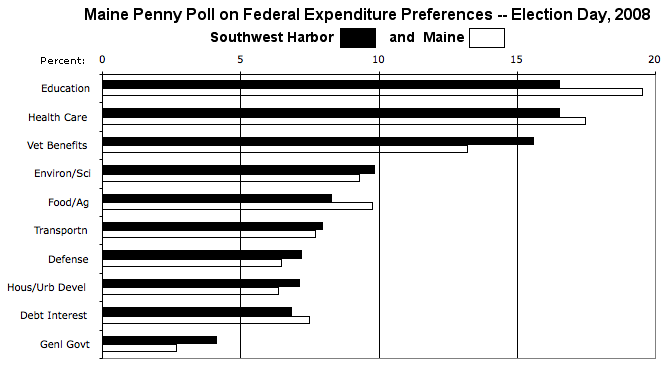On Nov. 8, Election Day, volunteers conducted "Penny Polls" at 11 polling locations in Maine, asking more than 2,000 people in Maine who had just voted: "How would you like your federal tax dollars to be spent?"
Education (20 percent), health care (18 percent), and veterans' benefits (13 percent) were the top priorities among those polled. Towns and cities represented included Southwest Harbor, Portland, Lewiston, Bowdoinham, Belgrade, Wilton, Skowhegan, Belfast, Monroe, Old Town, and Orland.
On Election Day, almost half (44 percent) of the registered voters who showed up to vote at the fire station in Southwest Harbor took the opportunity to express themselves as to how they felt. The results, summarized most simply, were more for. social programs, less for defense.
After leaving the polls, these 290 voters came over to a table on which had been placed 10 canning jars. The jars were labeled to represent 10 federal discretional spending categories. Discretionary spending is everything except the independent pension and insurance systems of Social Security and Medicare, and the paying down of the national debt. The voters were given, 10 pennies and asked to distribute them among the jars in whatever proportion they would prefer their tax dollars to be used.
The Southwest Harbor results in black, and the Maine results in white, for the Election Day poll are shown in the accompanying chart.

Although some voters in Southwest Harbor approached the task quickly and without much thought, or jokingly suggested taking the pennies and running, for many what at first seemed like a simple matter suddenly became more complicated and difficult. They had only 10 pennies and a lot of spending decisions to make. The task was made harder by categories that included likes and dislikes.
In the end, many got a feel for what a congressperson has to deal with, having to decide what really matters when a beloved bill gets loaded down with unwelcome riders.
ith the way taxpayer dollars are
currently spent by Congress.
In both polls, participants voted with their pennies for human needs funding -- education, health care, veterans' benefits, environment/ science, and food/agriculture programs -- with very little spent on the category labeled "defense."
Participants were not coached on how to respond; they were simply asked to participate in a survey and asked how they would like to see their federal tax dollars spent. Volunteers did not identify their own preferences or display political material.
According to the National Priorities Project's calculations of the 2010 budget for U.S. discretionary spending, where individual income taxes actually go, "Defense" receives 58 percent of every tax dollar. "Education," "environment/science," and "general government" (Treasury, Justice, Congress, and the White House), receive 6 percent, "health care," "veterans' benefits," and "housing" each get 5 percent, with "transportation" at 2 percent and "food/agriculture" at 1 percent."
While there are various ways of calculating the discretionary budget that the Supercommittee is charged with reducing, most agree that the Pentagon portion of that budget is in excess of 50 percent for 2010. This portion does not include the cost of operating the Veterans' Administration.
The contrast between how taxpayers want their money spent and how Congress spends it could hardly be more dramatic. The Pentagon receives about nine times more than what participating taxpayers want it to have, while education and health care get less than one-third of what taxpayers advocate, and veterans' benefits less than half. Transportation and food/agriculture both get shortchanged as well.
Congress and the people who pay the tab are on different wavelengths. It is clear that, if Congress makes cuts, they should be primarily, if not entirely, in the Pentagon portion of the budget.
Why are spending priorities between the public and Congress so different? Are people in Congress that removed from the realities of daily life that they don't worry about education, health care, veterans' benefits, and other issues important to the rest of us? Are they under the thumb of lobbyists, especially those representing military contractors, and wealthy donors to their campaigns? Is there a culture of militarism -- the necessity of wars, foreign bases, and a huge military -- that only lives in corporate board rooms and in Congress?
The huge gap between what the public wants and what Congress allocates brings up questions about how much of a democracy we have in this country. The current Occupy Wall Street movement and its local offshoots point out how our democracy is slipping away, as members of Congress get richer and become part of the 1 percent, rather than part of the 99 percent.
Our democracy is in crisis; millions have lost faith in a system that claims to represent them. Unless Congress listens to and reflects the wishes of the vast majority in this country, popular support of our economic system, tax system, and government will continue to erode.